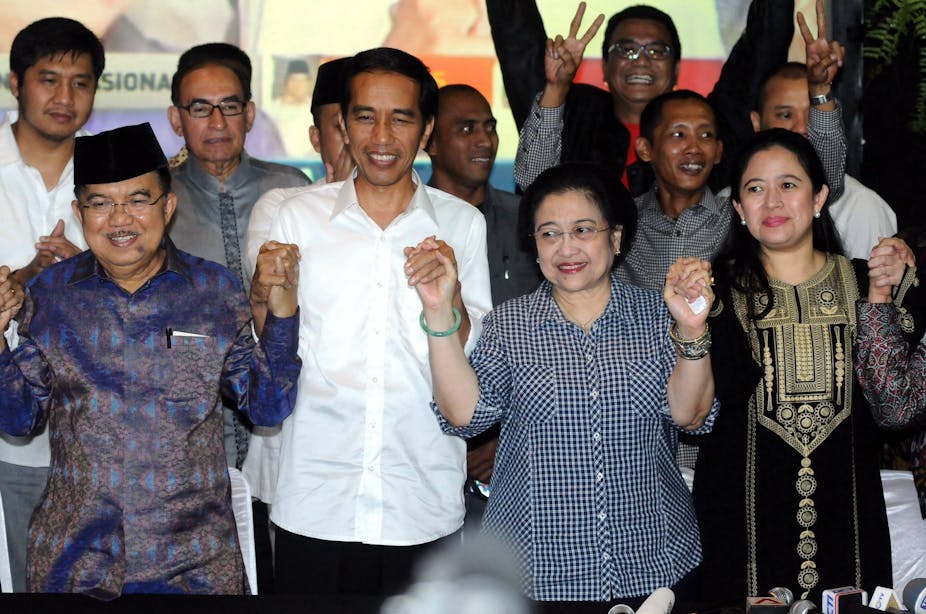Entering the fourth month since his inauguration, Indonesian President Joko Widodo (popularly known as Jokowi) is facing challenges to his leadership and to anti-corruption efforts in Southeast Asia’s biggest economy.
Jokowi has had a roller-coaster of political events in his first 100 days as president. He survived forming a cabinet amidst tussles between party coalitions for and against him in the parliament. He managed to carry out the unpopular policy of scrapping fuel subsidies.
Now Jokowi’s most formidable test is coming from his own political party and the coalition backing his presidency. They have placed him in the middle of a head-to-head rivalry between the Corruption Eradication Commission (KPK) and the National Police (Polri).
KPK versus Polri saga
The national saga of the KPK versus Polri started with Jokowi’s shocking nomination of Budi Gunawan, a mediocre high-ranking officer with a tainted reputation, as the sole candidate for police chief. People believe the PDI-P party chairwoman, Megawati Sukarnoputri, and other members of the political elite who backed Jokowi’s presidency pushed the appointment of Gunawan, Megawati’s former adjutant.
Dejected by the nomination, the KPK quickly declared Gunawan a suspect for various graft cases in 2010. Many believed KPK’s move was politically motivated. It has long been known that several high-ranking police officials have “rekening gendut” (bulging bank accounts) from grafts and bribes.
Jokowi tried to play it safe by handing over the nomination to the parliament. But despite KPK’s accusation, the Indonesian parliament nearly unanimously endorsed Gunawan’s nomination.
The public took to the streets in protest. The media coverage was also packed with moral suasion for the president not to appoint a corrupt figure as police chief. On January 16, Jokowi postponed Gunawan’s inauguration.
In a move many consider a police reprisal against the KPK, police arrested a KPK commissioner under flimsy charges of encouraging perjury when he was a private lawyer. The police have stated that three other commissioners are under investigation. By law, the KPK needs a quorum of three to function. Further police prosecutions will paralyse it.
Jokowi’s letter-of-the-law handling of the issue shows that he is having difficulties in dealing with the PDI-P and party elites who backed him in the presidential elections. As the first president from outside the old political establishment, Jokowi must consider the wishes of Megawati, Nasdem party leader Surya Paloh, and his vice-president, Jusuf Kalla, from the Golkar party.
Although the public strongly supports Jokowi, if he dismissed Budi, party elites might consider him disloyal. Some politicians are even muttering about impeaching the president.
Jokowi is looking to gain support from other prominent figures. He met his ex-rival during the presidential race, Prabowo Subianto, who seemed to be willing to back any Jokowi decision on the matter. The president also met with former president B.J. Habibie, who declared his support for Jokowi’s decisions.
Key test for Jokowi
The KPK and Polri rift serves as a key test for Jokowi to prove that he is not Megawati’s puppet-president, as Prabowo frequently asserted during his presidential campaign. Once Jokowi can solve this political mess and show his commitment to wiping out corruption, he may be able to handle bigger issues of governance in the next five years.
Yet Jokowi seems to be buying time, calculating all possible consequences in deciding on the candidate for police chief. He recently posted a Javanese proverb to his Facebook account: Suro diro jayaningrat, lebur dening pangastuti, which literally means: “All the stubbornness, anger and narrow-mindedness shall be finally subdued by wisdom and compassion.”
But he should not wait too long. People’s faith in Jokowi is running low. The longer it takes to make the decision, the faster public opinion is eroded as they would think his commitment to eradicate corruption is waning. Jokowi’s campaign volunteers have threatened to withdraw their support if the president is lenient toward corrupt officials.
The president should understand that in fighting corruption striking a political balance is not good enough. Amid ongoing debates on legal standing, he has to take sides with the KPK’s move to investigate corruption in the police top brass.
A reformed national police is very important; many Indonesians know from their personal experience the police cannot be trusted. It is high time for the president to cleanse the police of corrupt officials from top to bottom.

